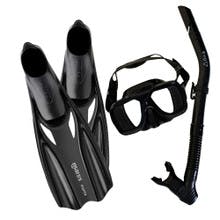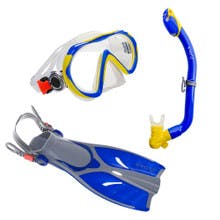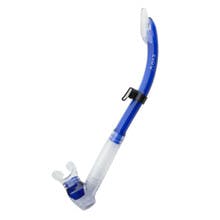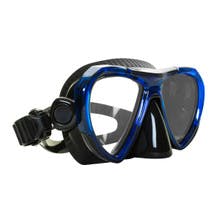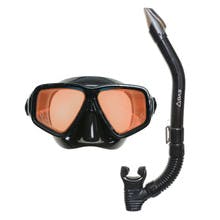Snorkeling FAQs
Is snorkeling hard for beginners?
Snorkeling is not hard for beginners. If you know how to swim, you can snorkel. With a well-fitted scuba mask, an appropriate snorkel, and comfortable fins, snorkeling can be a relaxing and enjoyable experience. For beginners, we’d recommend a snorkel vest and a rashguard or wetsuit.
Can non-swimmers do snorkeling?
Of course! It may be nerve-wrecking at first, but a snorkel vest should make non-swimmers feel secure on the surface. The most important lesson for non-swimmers is to remain calm. Having well-suited equipment will also enhance their experience. Having a comfortable, leak-free scuba mask, a dry snorkel, and proper fins should make snorkeling enjoyable.
Is snorkeling safer than scuba diving?
Because snorkeling is conducted at the surface level and requires less gear, it is considered safer than scuba diving. While both activities involve exploring open water, snorkeling requires less, if any, training.
What snorkel gear do I need to go snorkeling?
Snorkeling requires a simple setup of a mask, a snorkel, and a set of fins. If you don’t plan on swimming underwater, a snorkeling vest will help anxious swimmers feel reassured on the surface. Your mask is the most important piece of gear since it helps you see clearly underwater. You don’t want to be uncomfortable or clear water out every few seconds. The snorkel helps you breathe while your eyes remain underwater. Your fins help you explore more with less effort, making your kicking more efficient. Lastly, depending on the water temperature and UV index, you may want a rashguard or wetsuit.
Do I need special training to go snorkeling?
Not at all! Snorkeling can be physically demanding, but almost anyone can do it. Snorkeling can be rather easy and relaxing. It’s always a good idea to check water conditions before going out for a snorkel since choppy waters and heavy currents can make snorkeling more difficult, even with the proper snorkel gear.
How do I know what kind of snorkel to get?
Many snorkelers prefer a dry top snorkel for their adventures since a dry top snorkel is most effective in keeping water from entering your snorkel tube, but each snorkeler has his or her own preference. A semi-dry top can keep a fair amount of water from entering the snorkel tube and is a great choice for snorkelers who also go diving or hope to go scuba diving in the future. You may prefer a J-type snorkel if you aspire to freedive since J-type snorkels reduce drag in the water. Therefore, your snorkel preference will depend mainly on what other activities you participate in.
Do I need a specific type of snorkeling fin?
Snorkel fins tend to be shorter than scuba or freedive fins. This is because they’re shorter fins are easier to move with when finning along the surface. Both full foot and open heel fins are fine to wear, but full foot fins are more commonly used for snorkeling since you’ll most likely be in warmer waters and won’t need the neoprene boots that you’d need with open heel fins.
Should I rent or buy snorkeling gear?
Buying snorkel gear is the best way to ensure that your gear will fit properly and comfortably. It’s also the most sanitary option since you know exactly who used your snorkel gear last — you! Even if you only go snorkeling once in a blue moon, you’ll find that you’re more comfortable in gear that you’ve used time and time again.
There are so many snorkel masks out there. How do I choose the right one?
The number one thing you’ll need to look for in a snorkeling mask is fit and comfort. If your snorkel gear doesn’t fit right (especially your mask), you’ll find your adventure to be potentially uncomfortable and frequently interrupted by mask clearing, strap adjustments, and other quick-fix attempts. Field-of-view preferences, lens, and skirt coloring are some features to consider when picking a scuba mask. For more information, check our Scuba Mask Buyer’s Guide
Where to snorkel in Florida?
- Rainbow Springs/KP Hole - Dunnellon
- Three Sisters Springs - Crystal River
- Points of Rocks - Siesta Key - Crescent Beach
- Blue Heron Bridge (aka Phil Foster State Park) - Riviera Beach
- Red Reef State Park - Boca Raton
- Suzanne's Ledge - Pompano Beach
- Lauderdale by the Sea - Lauderdale by the Sea
- Shipwreck Snorkel Trail - Lauderdale by the Sea
- Vista Park Reef - Fort Lauderdale
- Dania Beach Erojacks - Dania Beach
- Hollywood North Beach - Hollywood
- Biscayne National Park - Homestead
- Horseshoe Reef - Key Largo
- Christ of the Abyss - Key Largo
- Pickles Reef - Key Largo
- Fort Zachary Taylor - Key West





